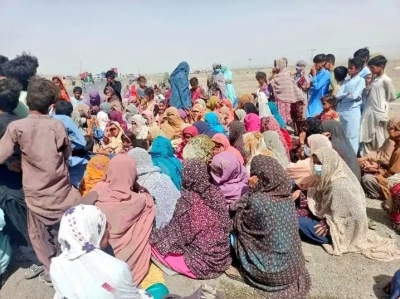324 corrupt Pakistan officials pocketed Rs 37 million meant for poverty alleviation: Report
By IANS | Updated: August 31, 2025 15:35 IST2025-08-31T15:34:00+5:302025-08-31T15:35:16+5:30
Islamabad, Aug 31 Plagued by opaque biometric systems, Pakistan’s social safety net has fallen prey to insidious decay, ...

324 corrupt Pakistan officials pocketed Rs 37 million meant for poverty alleviation: Report
Islamabad, Aug 31 Plagued by opaque biometric systems, Pakistan’s social safety net has fallen prey to insidious decay, with the Auditor General revealing that 324 government officials embezzled over Rs 37 million from the Benazir Income Support Programme (BISP), local media reported on Sunday.
According to Auditor General of Pakistan (AGP) officials, BISP staff from Grade 1 to Grade 22, or literally every level of seniority and qualification, were involved in graft, leading Pakistani daily 'The Express Tribune' reported.
The BISP was designed to provide a lifeline to millions living in poverty, but has repeatedly been undermined by corruption and malfeasance at multiple levels. The Rs 37 million graft is merely the tip of the iceberg. In March, audit reports uncovered financial irregularities worth Rs 141 billion in BISP for FY24, including payments to ineligible recipients, fake biometric verifications and funds disbursed to deceased individuals, said the report.
In effect, those entrusted with administering aid to the poor are instead perpetuating poverty, it said.
The involvement of officials across all grades illustrates the deeply ingrained culture of impunity. Even more egregious are reports of bank employees and retailers illegally and fraudulently charging beneficiaries fees when they try to use their BISP cards, said the 'The Express Tribune' report.
In some of the reported cases, the perpetrators curiously escaped criminal charges despite being caught red-handed and named publicly. Unfortunately, even if guilty officials are prosecuted and terminated, recent history has shown that the fear of consequences has not particularly slowed corruption in most government departments, and BISP is no different, it said.
Controls need to be more proactive, including transparent biometric systems, stricter verification processes and independent monitoring mechanisms, said the report.
The BISP supports around 58 million people, or almost a quarter of the country's population. Allowing it to become a corrupt and untrusted institution is not just a betrayal of honest and deserving beneficiaries, but of every single taxpayer and international donor supporting the programme, it said.
--IANS
rch/dpb
Disclaimer: This post has been auto-published from an agency feed without any modifications to the text and has not been reviewed by an editor
Open in app